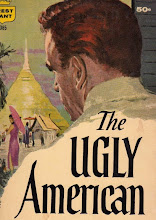"The Mystery of the Poor" by Dorothy Day
On Holy Thursday, truly a joyful day, I was sitting at the supper table at St. Joseph's House on Chrystie Street and looking around at all the fellow workers and thinking how hopeless it was for us to try to keep up appearances. The walls are painted a warm yellow, the ceiling has been done by generous volunteers, and there are large, brightly colored icon-like paintings on wood and some colorful banners with texts (now fading out) and the great crucifix brought in by some anonymous friend with the request that we hang it in the room where the breadline eats. (Some well-meaning guest tried to improve on the black iron by gilding it, and I always intend to do something about it and restore its former grim glory.)
I looked around and the general appearance of the place was, as usual, home-like, informal, noisy, and comfortably warm on a cold evening. And yet, looked at with the eyes of a visitor, our place must look dingy indeed, filled as it always is with men and women, some children too, all of whom bear the unmistakable mark of misery and destitution. Aren't we deceiving ourselves, I am sure many of them think, in the work we are doing? What are we accomplishing for them anyway, or for the world or for the common good? "Are these people being rehabilitated?" is the question we get almost daily from visitors or from our readers (who seem to be great letter writers). One priest had his catechism classes write us questions as to our work after they had the assignment in religion class to read my book The Long Loneliness. The majority of them asked the same question: "How can you see Christ in people?" And we only say: It is an act of faith, constantly repeated. It is an act of love, resulting from an act of faith. It is an act of hope, that we can awaken these same acts in their hearts, too, with the help of God, and the Works of Mercy, which you, our readers, help us to do, day in and day out over the years.
On Easter Day, on awakening late after the long midnight services in our parish church, I read over the last chapter of the four Gospels and felt that I received great light and understanding with the reading of them. "They have taken the Lord out of His tomb and we do not know where they have laid Him," Mary Magdalene said, and we can say this with her in times of doubt and questioning. How do we know we believe? How do we know we indeed have faith? Because we have seen His hands and His feet in the poor around us. He has shown Himself to us in them. We start by loving them for Him, and we soon love them for themselves, each one a unique person, most special!
In that last glorious chapter of St. Luke, Jesus told His followers, "Why are you so perturbed? Why do questions arise in your minds? Look at My hands and My feet. It is I Myself. Touch Me and see. No ghost has flesh and bones as you can see I have." They were still unconvinced, for it seemed too good to be true. "So He asked them, 'Have you anything to eat?' They offered Him a piece of fish they had cooked which He took and ate before their eyes."
How can I help but think of these things every time I sit down at Chrystie Street or Peter Maurin Farm and look around at the tables filled with the unutterably poor who are going through their long-continuing crucifixion. It is most surely an exercise of faith for us to see Christ in each other. But it is through such exercise that we grow and the joy of our vocation assures us we are on the right path.
Most certainly, it is easier to believe now that the sun warms us, and we know that buds will appear on the sycamore trees in the wasteland across from the Catholic Worker office, that life will spring out of the dull clods of that littered park across the way. There are wars and rumors of war, poverty and plague, hunger and pain. Still, the sap is rising, again there is the resurrection of spring, God's continuing promise to us that He is with us always, with His comfort and joy, if we will only ask.
The mystery of the poor is this: That they are Jesus, and what you do for them you do for Him. It is the only way we have of knowing and believing in our love. The mystery of poverty is that by sharing in it, making ourselves poor in giving to others, we increase our knowledge of and belief in love.
Dorothy Day, “The Mystery of the Poor,” from Dorothy Day: Selected Writings, edited by Robert Ellsberg, published by Orbis Books, 1983. Used with permission.
NOTE: I RECOVERED THIS ARTICLE FROM THE NOW DEFUNCT http://www.bruderhof.com/articles/MysteryOfThePoor.htm USING THE INTERNET ARCHIVE WAYBACK MACHINE.
Labels: catholic worker, dorothy day, poverty


0 Comments:
Post a Comment
<< Home